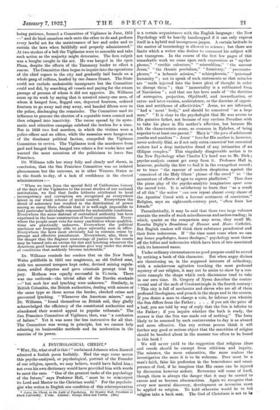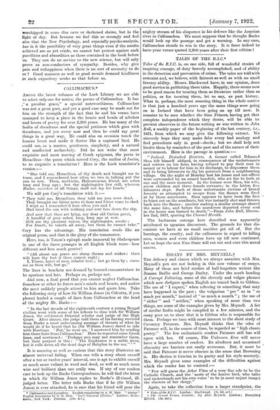A PSYCHOLOGICAL CHRIST.*
" WHY, Sir, what stuff is this ! " exclaimed Johnson when Boswell admired a foolish poem foolishly. Had the sage come across this psycho-analysed, or psychological, portrait of the Founder of our religion, speech, we may believe, would have failed him , not even his own dictionary would have provided him with words to meet the case. " One of the greatest tasks of the psychology of the future," says Professor Hall, " must be to reinterpret its Lord and Master to the Christian world." For the psycholo- gist who writes in English one condition of this reinterpretation • Jesus, the Christ, in the Light of Psychology. By Stanley Hall, President of Park University. 2 vols. London : George Allen and Unwin. [303.) is a certain acquaintance with the English language : the Nevi Psychology will be heavily handicapped if it can only expres$ itself in a hybrid rtnd incongruous jargon. A certain latitude in the matter of terminology is allowed to science ; but there are limits which a writer who desires to commend his subject will not transgress. In the course of the first few pages of this remarkable work we come upon such expressions as " mytho- pheme," " erethic calenture," " miserablism," " the garcons Jesus," " the thumic pendulum," " formicary," " pneumato- phores," " a hebamic mission," " schizophrenia," " ipsissimal humanity " ; not to speak of such statements as that miracles are " surds injected into the lower plexi of thought in order to disrupt them " ; that " immortality is a sublimated form of Narcissism " ; and that use has been made of " the doctrine of surrogates, projection, Objektwahl, and inwardization, or extro- and intro-version, ambivalence, or the doctrine of opposi- tion and antitheses of affectivities." Jesus, we are informed, " had a ' meat ' body," and should be conceived " as a large man." " It is clear to the psychologist that He was averse to His putative father, not because of any envious Freudian wish to take his place in His mother's affection, but because He felt the characteristic sense, so common in Ephebes, of being superior to at least one parent." Mary is " the gory of adolvteent youths and maidens " : Jesus' " love for His mother is, however, never ardently filial, as if not only extra-canonical but canonical writers had a deep instinctive dread of any intimation of an (Edipus complex." This singularly disagreeable notion is to the New Psychology what Charles I.'s head was to Mr. Dick ; psycho-analysis cannot get away from it. Professor Hall is, however, probably the first to find it in the evangelical record ; or to trace " the rancour of modern skepticism against the ` conceived of the Holy Ghost ' phrase of the creed " to " the momentum of efforts of ages to repress phallicism." Thus does the pious play of the psycho-analytic imagination sport over the sacred text. It is satisfactory to learn that " as a result of all this " the writer " can now repeat almost every clause of the Apostles' Creed with a fervent sentiment of conviction." Religion, says an eighteenth-century poet, " often fears her friends."
Parenthetically, it may be said that these two large volumes contain the results of much miscellaneous and useless reading; in which, quaint as the comparison may seem, they recall Mr. Kenelm Digby's Broadstone of Honour and Mores Cathairi. But English readers will think their substance paradoxical and their form indecorous. If " the time must come when we can say bonus psychologus, bonus theologus," psychology must throw off the follies and indecencies which have been of late associated with its honoured name.
Under ordinary circumstances no good purpose could be served by noticing a book of this character. But when angry divines are threatening us, in the supposed interests of orthodoxy, with a mischievous agitation touching the most profound mystery of our religion, it may not be amiss to show by a con- crete example the shape which such discussions tend to take in our own time. St. Gregory of Nyasa describes the contro- versial zeal of the mob of Constantinople in the fourth century: " This city is full of mechanics and slaves who are all of them profound theologians, and preach in the shops and in the streets. If you desire a man to change a coin, he informs you wherein the Son differs from the Father ; . . . if you ask the price of a loaf, you are told by way of reply that the Son is inferior to the Father ; if you inquire whether the bath is ready, the answer is that the Son was made out of nothing." The form likely to be assumed by such controversies to-day is as absurd and more offensive. Can any serious person think it will further any good or serious object that the sanctities of religion should be bandied about in the manner too often to be found in this book ?
We will never yield to the suggestion that religious ideas and creeds should be exempt from criticism and inquiry. The minuter, the more exhaustive, the more zealous the investigation the more it is to be welcome. Poor must be a man's faith, false his profession in the benevolence and omni- potence of God, if he imagines that His cause can be injured by discussion however ardent. Reverence will come of itself, though there is always the danger that it may be carried to excess and so become obscurantisni. Again we recognize that every new mental discovery, development or invention must be applied to religion. To hold otherwise would be to bid religion take a back seat. The God of Christians is not to be worshipped in some dim cave or darkened shrine, but in the light of day. But because we feel this so strongly and feel also that the New Psychology, and especially psycho-analysis, has in it the possibility of very great things even if the results achieved are as yet crude, we cannot but -protest against such puerilities and absurdities as those contained in the book before us. They can do no service to the new science, but will only prove as non-conductors of sympathy. Besides, why give pain and unhappiness when there is no sort of necessity to do so ? Good manners as well as good morals demand kindliness in such expository works as that -before us.











































 Previous page
Previous page